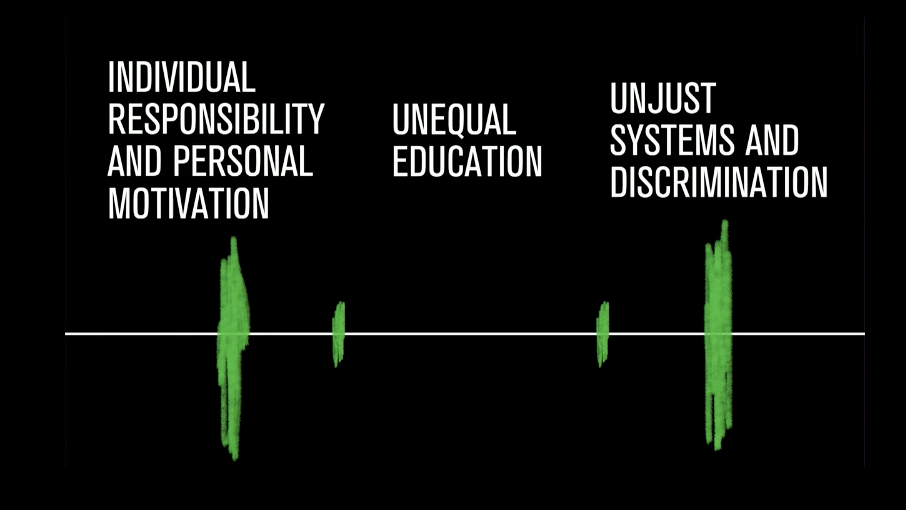Platt went on to discuss a poll taken asking people why the disparity exists between different races in America. Participants were asked to respond along a spectrum of three options (placed left to right): individual responsibility and personal motivation; unequal education; and unjust systems and discrimination. White non-Christians responded toward the left side of the line, in between the first two options while black non-Christians responded more on the right side of the scale. The most interesting part, though, is that white professing Christians (the longer green line on the left of the illustration) were even more prone than their non-Christian counterparts to respond far left. Black, professing Christians were more likely to respond further on the right side of the scale (the longer green line on the right) compared to their non-Christian counterparts.
Platt says the poll shows that if everyone in America were Christian, we would still have a racism problem due to the difference in the way we see the problem of disparity. The point that Platt emphasizes is that we really don’t understand one another.
Our politics don’t unite us, Platt says, but Jesus should.
This is going to mean giving up our preferences and perhaps even our models of church growth. Platt says church growth sometimes focuses on growing a church with one ethnicity by appealing to people’s preferences for church. However, this is in contrast to the growth of the early church. Paul didn’t encourage the Jewish followers of Christ to stay in their Jewish bubbles. In fact, he did the opposite.
Exacerbating the divide in church is the fact that white preachers, in particular, shy away from addressing race in the pulpit. Studies have shown this, Platt says. “If you want to draw a crowd in general, stay away from racial issues.” The reason it’s unpopular is because people come to church to be comfortable.
“This word has the power to bring together God’s people, and if it’s not doing that, then we need to seriously ask if we’re faithfully preaching and leading according to it—all of it. The whole counsel of it. Not just that which appeals to our preferences and our politics and people like us with preferences like ours that we want to be popular among.”
We can’t be afraid of losing the crowd, Platt says.
Platt says he has blind spots as a white person. Those blind spots will only be revealed to him by people of different races, he says. “I trust we know that, speaking broadly, in every era of American racism, white churches and their pastors have, on a whole, been found complacent. Think specifically slavery and civil rights. There’s no question.”
He suggests starting the work of justice by asking yourself these questions:
Are you meekly learning from and listening to people of different ethnicities who think differently from you?
Are you actively laying aside your preferences for people of different ethnicities?
Are you working to leverage your influence for racial justice?
“Let’s long for the day when justice will be perfect,” Platt concludes.















